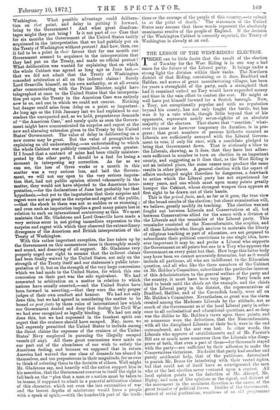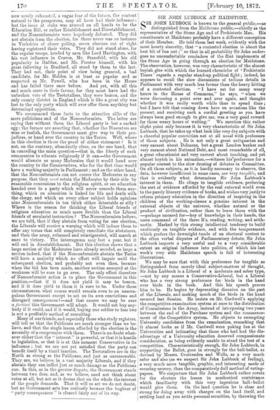THE LESSON OF THE WEST-RIDING ELECTION.
THERE can be little doubt that the result of the election of Tuesday for the West Riding is in one way a bad omen for the future of the Liberal party. It brings under a strong light the division within their 'ranks. The Northern district of that Riding, containing, as it does, Bradford and Halifax, and scores of great manufacturing villages, has been for years a stronghold of the party, such a stronghold that had it remained united no Tory would have expended money and time in the vain effort to contest the seat. He might as well have put himself forward for a Scotch borough. Now, a Tory, not exceptionally popular and with no reputation beyond his county, has not only fought the battle, but has won it by a vote which, though little beyond that of his opponents, represents nearly seven-eighths of an absolute majority of the electors. That shows that "reaction," what- ever its cause or however temporary its duration, is in pro- gress ; that great numbers of persons hitherto counted as Liberals are sufficiently annoyed with the Liberal Govern- ment to vote, if only for once, with a candidate pledged to bring that Government down. That is obviously a blow to the Liberals, showing, as it does, that they have lost adher- ents sufficient in number to turn an election in an important county, and suggesting as it does that, as the West Riding is not an isolated place, the same causes may produce the same results in other places. A general election with the aspect of affairs unchanged might therefore be dangerous, a drawback to action which the Liberal party has not experienced for many years, and one which must upon many points greatly hamper the Cabinet, whose strongest weapon thus appears at first sight to be drawn out of their hands.
This is the prinici facie, and, as far as it goes, the true view of the broad results of the election; but closer examination will, we believe, greatly modify its teaching. The election was not fought out between Liberals and Conservatives at all, but between Conservatives allied for the nonce with a division of the Liberals and the remainder of the Liberal party. This remainder consisted of the Nonconformists, the sceptics, and all those Liberals who, though anxious to maintain the liberty of religious teaching as part of education, are not prepared to subordinate their political convictions to one single idea, how- ever important it may be, and prefer a Liberal who supports the Government on all points but one to a Tory who opposes the Government on every point but that. How large this latter body may have been we cannot accurately determine, but as it would include all partizans, all who are indifferent to the Education question, and all who, like the three members of the Cabinet on Mr. Holden's Committee, subordinate the particular interest of this Administration to the general welfare of the party and the country, it must have been very large. Party bonds are hard to break until the chiefs set the example, and the chiefs of the Liberal party in the district, the representatives of Bradford, Halifax, and of the Cavendish family, were all on Mr. Holden's Committee. Nevertheless, so great was the alarm created among the Moderate Liberals by the attitude, not so much of the Government as of the local Liberal party in refer- ence to all ecclesiastical and educational questions, and so deep was the dislike to Mr. Holden's views upon those points, and so numerous were the defections, that the Nonconformists, with all the disciplined Liberals at their back, were in the end outnumbered, and the seat was lost. In other words, the Liberals who approve of establishments and of Mr. Forster's Bill are so much more numerous than the Liberals who disap- prove of both, that even a part of them—for thousands stayed with the party—are sufficient by their adhesion to make the Conservatives victorious. No doubt that party had another and purely accidental help, that of the publicans, determined to punish Mr. Bruce for interfering with their vested rights, but that could not of itself have so reinvigorated the men who at the last election never ventured upon a contest. All local opinion points to the defection of Mr. Akroyd, Mr. Ripley, and men of like opinions as the signal, and distrust of the movement in the secularist direction as the cause, of the great transfer of political forces. Dislike of the Government, hatred of social puritanism, weariness of an old programme
now nearly exhausted, a vague fear of the future, the content natural to the prosperous, may all have had their influence : but the issue at stake was avowed on all hands to be the Education Bill, or rather Establishment and Disestablishment, and the Nonconformists were hopelessly defeated. They did not abstain from the election, for there never was an instance in Yorkshire of closer polling, seven electors out of eight having registered their votes. They did not stand alone, for the regular troops, headed by men like Lord Hartington, with his vast influence in Craven, Mr. Stansfeld, with his old popularity in Halifax, and Mr. Forster himself, with his great following in Bradford, all stood by them to the last. They had not, their point of view being granted, a bad candidate, for Mr. Holden is at least as popular and as respected as Mr. Powell, who has been in the House and has failed there once before. And yet, with all this and much more in their favour, for they must have had the unbroken vote of the Teetotallers, they were beaten, and the only county district in England which is like a great city was lost to the only party which will ever offer them anything but determined opposition.
We recommend these facts to the attention alike of the mere politicians and of the Nonconformists. The latter are saying that without them the Liberal party is but a sucked egg ; the former are asserting that, whether the Dissenters are wise or foolish, the Government must give way to their pre- judices, or hand over the country to the Tories. Well, where in this election is there the proof of either statement ? Is it not, on-the contrary, abundantly clear, on the one hand, that in conceding the main question—that is, the liberty of each communion to educate religiously if it can—the Government would alienate so many Moderates that it would hand over the country to the Conservatives, who for the first time would have a working majority in Parliament ; and on the other hand, that the Nonconformists can not coerce the Moderates to any purpose, that they must retain the Moderates by their side by reasonable concessions to the religious spirit, or see education handed over to a party which will never concede them any- thing, which on education is linked for life and death with the clergy, and which on every other subject holds opinions nine .Nonconformists in ten think either detestable or silly ? Where is the reason for thinkina. the Liberal friends of
religions education so much more thinking than the Liberal friends of secularist instruction ? The Nonconformists believe, we are told, that if they abstain from voting for one election, the Liberals will receive a warning which will induce them to offer any terms that will completely conciliate the abstainers, and then the army, reformed and reinvigorated, will march at once to victory. The interregnum may last a year, but it will end in disestablishment. But this election shows that a large section of the Moderates have already seceded, so large a section indeed, that if the Nonconformists abstain the Tories will have a majority which no effort will impair until the subsequent election, and probably not even then, because when the bid has been made, another section annoyed at the weakness will be sure to go over. The only effect therefore of Nonconformist action is to place the Government in this position,—that if it does not yield it may be beaten, and if it does yield to them it is sure to be. Under these circumstances, what course would remain even to an unscru- pulous Government except to act on its own convictions and disregard consequences ?—and that course we may be sure a fortiori this Government will adopt. It would not buy any- body if it could, and if it would, buying one soldier to lose two is not a profitable method of recruiting.
Many of our friends, and especially those who study registers, will tell us that the Publicans are much stronger than we be- lieve, and that the single lesson afforded by the election is the necessity of a compromise with them. There is no doubt what- ever either that the " interest " is powerful, or that it is hostile to legislation, or that it is at this moment Conservative in its influence ; but we are not yet satisfied that the party can benefit itself by a timid inaction. The Teetotallers are in the North as strong as the Publicans, and just as unreasonable. They are, we believe, in a vast majority Liberals, and if they abstain they can inflict just as much damage as the Publicans can. In this, as in the greater dispute, the Government stands between two fires, and, as we believe, need not think about votes at all, but act as it deems that on the whole the interest of the people demands. That it will so act we do not doubt, but no Government acts less zealously because the bugbear of " party consequences " is cleared fairly out of its way.



































 Previous page
Previous page